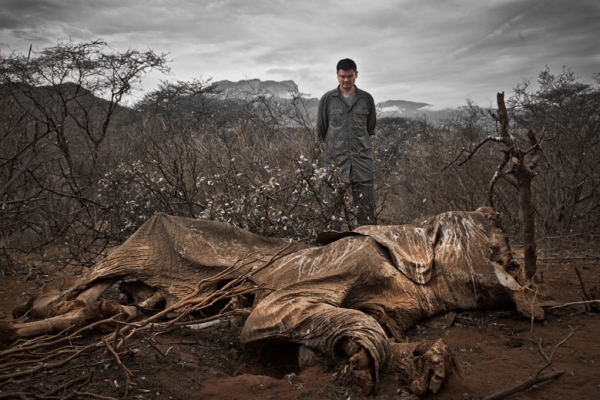


Photo: Kristian Schmidt/WildAid
By Anchalee Kongrut, a journalist from the Bangkok Post who is on exchange with the Economic Observer
After his successful drive against shark fin consumption, former NBA star Yao Ming is embarking on a new conservation campaign: Saving African elephants.
He’s not alone. Singer Li Yuchuan has also reportedly joined the mission. The attention given to the ivory trade by Chinese celebrities and media reflects the rising popularity of ivory goods among China’s nouveau rich. As demand in Japan flattens, China is emerging as the largest market for a trade that’s synonymous with trafficking. Yao Ming's message is clear: ''When the buying stops, then the killing will too.''
Yao’s campaign against shark fins yielded many tangible results, like Cathay Pacific Airlines banning shark fin shipments on cargo flights and the Chinese government issuing a ban on the dish at state-sponsored banquets.
However, Yao’s new effort isn’t likely to meet the same success. The ivory trade is more complicated and much more heinous. Known as ''white gold,'' ivory tusks are becoming a very lucrative business and empowering a terrifying collection of transnational syndicates.
According to a New York Times report on Aug 31, the trade has attracted groups like Joseph Kony's Lord's Resistance Army, Darfur's Janjaweed, al-Shabaab - a militant Islamist group with close ties to Al Qaeda, and the militaries of Congo, Uganda and South Sudan. The era of local village-poachers hunting with rifles on horseback is gone. New militant poachers now gun down elephants from helicopters.
A growing Chinese presence in Africa has been blamed as one of the enabling factors. Chinese workers on the continent are buying ivory as a new form of investment, driving its price up 100 percent over the last three years in China, according to The Wall Street Journal.
It’s not that the world lacks measures to deal with poachers. In 1989, the steady drop in the number of African elephants was slowing and beginning to flatten, thanks in large part to an international ban on the ivory trade known as the Convention on the International Trade in Endangered Species (CITES).
But the ban was partially lifted in 2007 as four African nations asked to be allowed to sell old stockpiled ivory and legal ivory from elephants that had died naturally. In 2010, these countries sold 100 tons of stockpiled ivory to Japan and China. Since then, the dormant trade has awoken as illicit traders have created a thriving black market through fake registrations and hidden shipments.
Last year was known as ''annus horribilis'' for African elephants. Illicit shipments of 23 tons of tusks from roughly 2,500 elephants were seized within single year, making it the worst period in the last two decades. In the previous year, illicit shipments were barely over 10 tons. Meanwhile, the number of African elephants went from 1.3 million in 1973 to just 45,000 in 2007.
As the destination for much of the illicit ivory, China has become a focus for calls to curb the industry. It’s very easy - too easy - to buy ivory goods in China. With the click of a mouse, hundred pages come up offering ivory products from chopsticks to bookmarks. Yao Ming's calls to stop the trade are a good start, but without a complete trade ban, it’s hard to see how the buying will stop.
Most campaigns against wildlife trafficking succeed with a decisive trade ban. In Thailand, which is still known as a major hub for ivory craftsmen, the illicit ivory trade has gradually stabilized and started to drop after two decades of public education and law enforcement enabled by a trade ban. Authorities and consumers finally see the same picture – that it’s legally and morally wrong to deal in the illicit market.
Certainly, Yao and conservationists have a daunting task in trying to educate people. According to a survey conducted by the International Fund for Animal Welfare last year, 70 percent of Chinese consumers didn’t know that elephants get killed for tusks. Some even thought that tusks fall off naturally, like people losing teeth.
Breathing life into Chinese professional basketball might prove to be easier for Yao Ming than saving African elephants from militant poachers and consumers. Without a trade ban in place, he has few teammates on his side.

